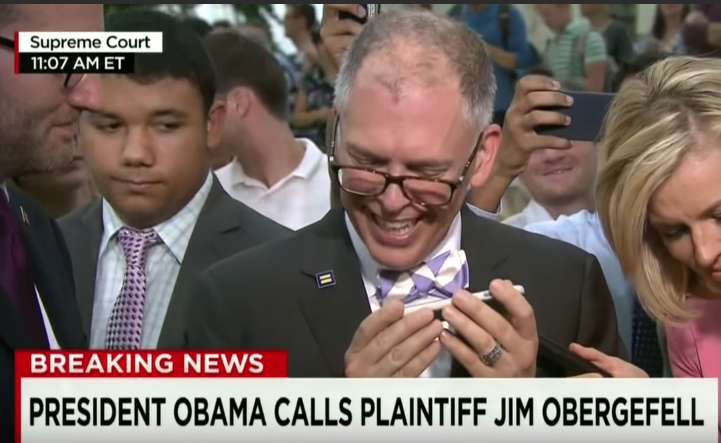President Obama's Phone Call to Jim Obergefell
6/26/2015
Add to Favorites:
Add all page(s) of this document to activity:

This video captures President Barack Obama calling Jim Obergefell on live television to congratulate him on the historic Supreme Court decision in the case that bore his name, which allowed same-sex marriage across the country. It was posted on YouTube by the Obama White House, and includes footage from CNN and of President Obama calling from the Oval Office.
In Obergefell v. Hodges, the Supreme Court ruled that the right to marry is a fundamental liberty and is protected under the Due Process and Equal Protection Clauses of the 14th Amendment. The decision required states to both issue marriage licenses between same-sex couples and recognize marriages between same-sex couples performed in any state.
The decision came exactly two years after the decision in United States v. Windsor required the Federal Government to treat same-sex marriages equally under the law.
Obergefell v. Hodges originated as the lower court case case of Obergefell v. Kasich in 2013. James Obergefell and his husband, John Arthur, sued Ohio Governor John Kasich for discrimination against same-sex couples who married lawfully out of state and, later, to force the state of Ohio to recognize same-sex unions on death certificates.
Obergefell v. Hodges, the Supreme Court case, is the amalgamation of four court cases from Michigan, Ohio, Kentucky, and Tennessee—Obergefell v. Hodges (2014), Tanco v. Haslam (2013), Bourke v. Beshear (2013), and DeBoer v. Snyder (2012)—all challenging the constitutionality of those states' bans on same-sex marriage.
In response to the Supreme Court's decision, Obergefell said, "No other person will learn at the most painful moment of married life, the death of a spouse, that their lawful marriage will be disregarded by the state. No married couple who moves will suddenly become two single persons because their new state ignores their lawful marriage."
In Obergefell v. Hodges, the Supreme Court ruled that the right to marry is a fundamental liberty and is protected under the Due Process and Equal Protection Clauses of the 14th Amendment. The decision required states to both issue marriage licenses between same-sex couples and recognize marriages between same-sex couples performed in any state.
The decision came exactly two years after the decision in United States v. Windsor required the Federal Government to treat same-sex marriages equally under the law.
Obergefell v. Hodges originated as the lower court case case of Obergefell v. Kasich in 2013. James Obergefell and his husband, John Arthur, sued Ohio Governor John Kasich for discrimination against same-sex couples who married lawfully out of state and, later, to force the state of Ohio to recognize same-sex unions on death certificates.
Obergefell v. Hodges, the Supreme Court case, is the amalgamation of four court cases from Michigan, Ohio, Kentucky, and Tennessee—Obergefell v. Hodges (2014), Tanco v. Haslam (2013), Bourke v. Beshear (2013), and DeBoer v. Snyder (2012)—all challenging the constitutionality of those states' bans on same-sex marriage.
In response to the Supreme Court's decision, Obergefell said, "No other person will learn at the most painful moment of married life, the death of a spouse, that their lawful marriage will be disregarded by the state. No married couple who moves will suddenly become two single persons because their new state ignores their lawful marriage."
Transcript
Male Speaker: I have to interrupt, I'm sorry.Pamela Brown is on the steps and she's with
Mr. Obergerfell who is getting a phone call from a
very important person.
Pamela?
Pamela Brown: Yes, and that very important person, Jake,
is President Obama calling Jim Obergerfell.
Jim Obergerfell: Hello?
The President: Hi, is this Jim?
Jim Obergerfell: Yes, it is, Mr. President.
The President: Jim, the -- I, I figured when I saw you
that we were going to be hoping for some good news
and we did it.
And I just wanted to say congratulations.
Jim Obergerfell: Thank you so much, Sir.
I think was your wishes.
The President: You know, your leadership on this, you
know, has changed -- changed the country.
Jim Obergerfell: I really appreciate that,
Mr. President.
It's really been an honor for me to be involved in
this fight and to have been able to, you know, fight for
my marriage and live up to my commitments to my
husband.
So, I appreciate -- I appreciate everything you've
done for the LGBT community and it's really an honor to
have become part of that fight.
The President: Well, I'm really proud of you and, you
know, just -- just know that, you know, not only
have you been a great example for people but
you're also going to, you know, bring about a lasting
change in this country.
And it's pretty rare where that happens.
So, I couldn't be prouder of you and your husband and
God bless you.
Jim Obergerfell: Thank you sir, that means an
incredible amount to me, and, yeah -- thank you.
The President: All right, take care.
Jim Obergerfell: Thanks for the call, Mr. President.
The President: You bet, bye bye.
Jim Obergerfell: Bye.
Pamela Brown: Jim, when you hear the President say to
you that your leadership has changed the country what is --
This primary source comes from the Collection BHO-WHCA: Records of the White House Communications Agency (Obama Administration).
Full Citation: 'Hi, is this Jim?'; 6/26/2015; Edited Video Projects, 1/20/2009 - 1/20/2017; Collection BHO-WHCA: Records of the White House Communications Agency (Obama Administration); Barack Obama Presidential Library, Hoffman Estates, IL. [Online Version, https://docsteach.org/documents/document/obama-calls-obergefell, April 26, 2024]Activities that use this document
- The Long Struggle for LGBTQ+ Civil Rights
Created by the National Archives Education Team
Rights: Copyright Not Evaluated Learn more on our privacy and legal page.



